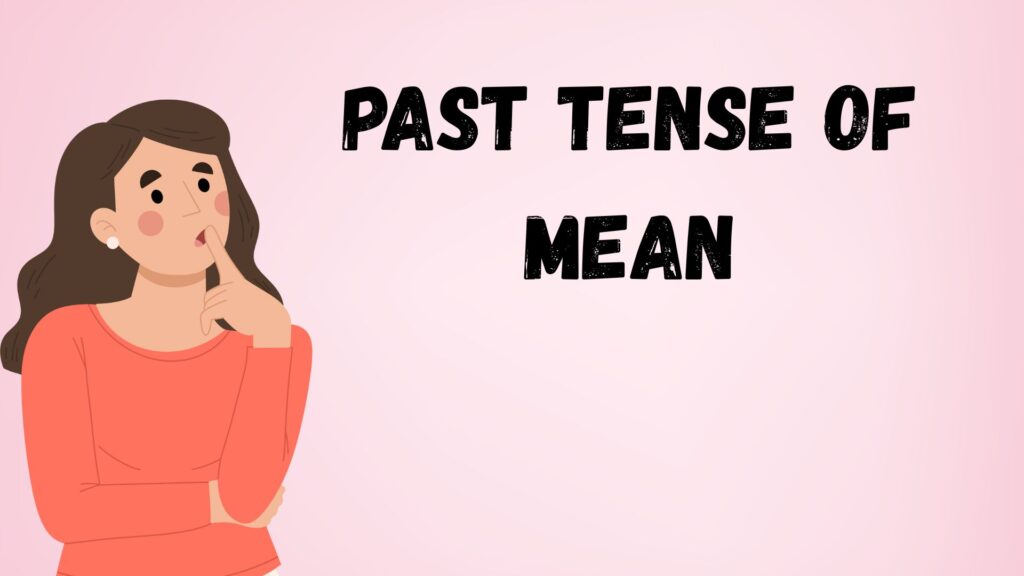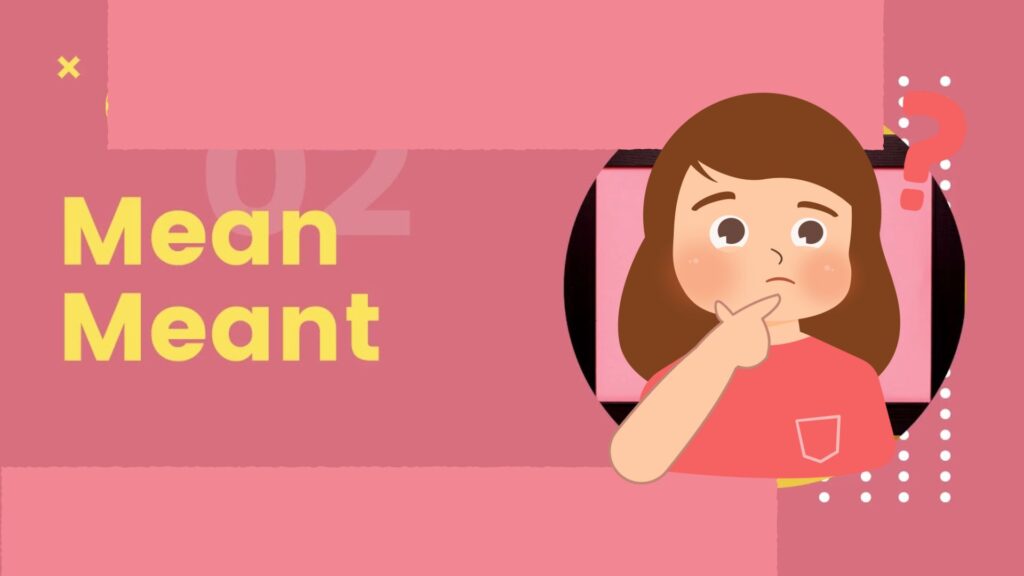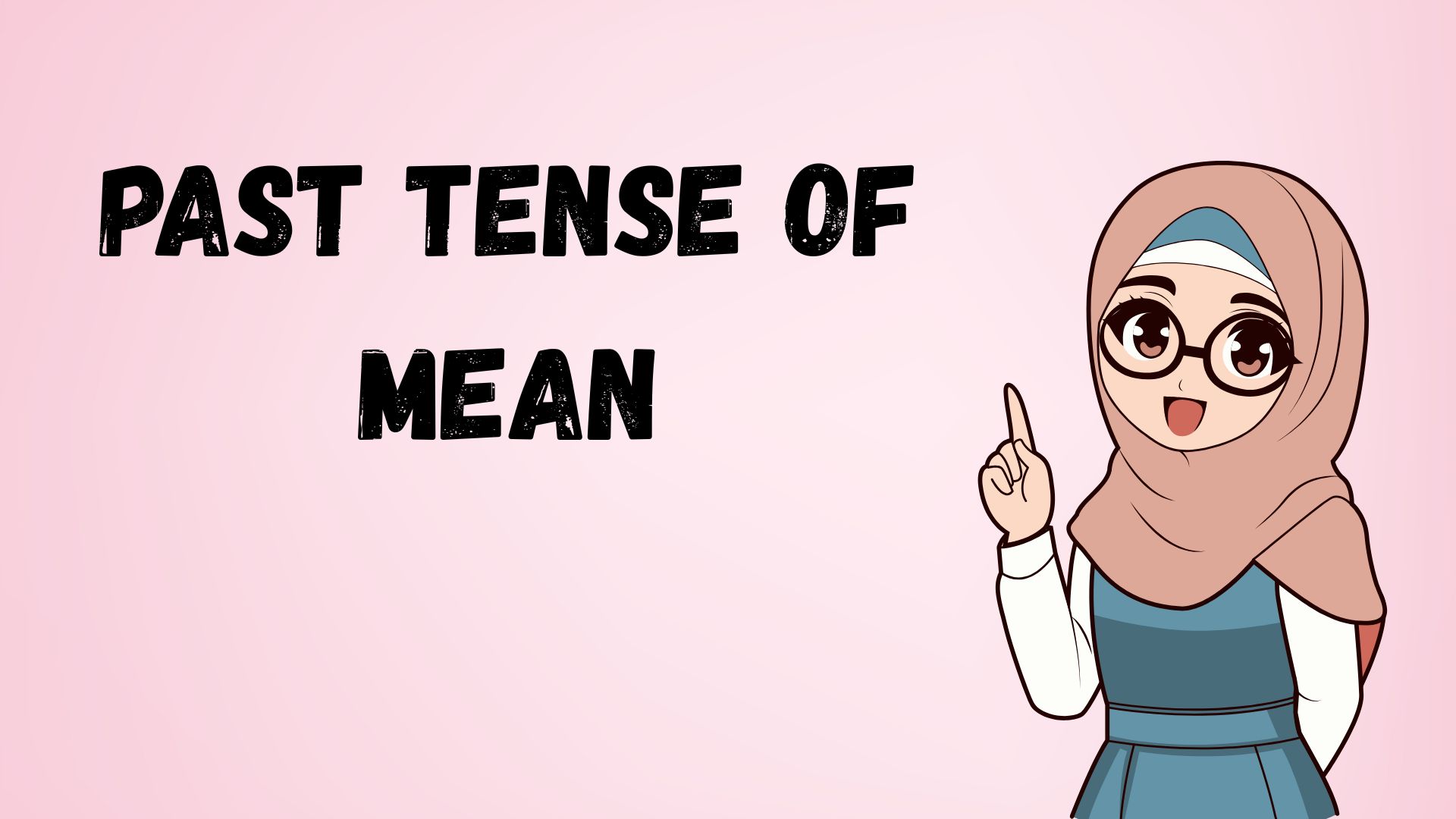Language learners often pause when asked, “What’s the past tense of mean?” It sounds simple enough, but if you’ve ever hesitated before writing mean or meant, you’re not alone.
✅ Quick Answer: It’s Meant

The verb mean is an irregular verb. That means its past tense doesn’t follow the typical “-ed” ending rule. The correct past tense and past participle of mean is meant spelled m-e-a-n-t, not meaned.
So just remember:
| Tense | Verb Form |
|---|---|
| Present Tense | mean |
| Past Tense | meant |
| Past Participle | meant |
| Present Participle | meaning |
| Future Tense | will mean |
Let’s dig into what this actually means in context. Understanding the Verb “Mean” Beyond Just a Definition
The verb mean has multiple definitions, which makes it a polysemous word one that has multiple meanings depending on context.
Common Uses of “Mean” as a Verb:
- To signify or indicate something:
What does this symbol mean? - To intend or plan to do something:
I mean to call her tomorrow. - To convey or express an idea:
He didn’t mean to offend you.
This variability is what linguists call semantic disambiguation using contextual meaning to clarify what a word intends to communicate.
When Do You Use “Meant”?

Whenever you’re talking about something in the past whether it’s what someone intended, implied, or indicated you’ll use meant.
✉️ Email Example (Intended Meaning – Past Simple)
Subject: Sorry for the Confusion Yesterday
Hi Sarah,
I just wanted to clarify something I said during our meeting. I meant to refer to the Q2 numbers, not Q1. Apologies if that caused any misunderstanding.
Best,
Mark
In this case, meant shows that Mark is referring to a past intention or expression he intended one thing, but may have said another.
Past Perfect and Perfect Tense Examples
You’ll also see meant used with auxiliary verbs like had, has, or have in perfect tenses.
🧠 Grammar Tip:
The past perfect or pluperfect tense uses had + past participle
The present perfect uses have/has + past participle
Example (Past Perfect):
He had meant to arrive early, but traffic delayed him.
Example (Present Perfect):
I have meant to visit her many times, but I keep postponing it.
Avoiding Common Errors Don’t Say “Meaned”
This is a classic ESL mistake. The verb mean doesn’t form its past tense the regular way. You can’t just add “-ed” to it.
🚫 He meaned to call you.
✅ He meant to call you.
If you’re ever unsure, remember: mean is an irregular verb just like buy/bought, bring/brought, or teach/taught.
What About “Meaning”? When Is That Used?
The form meaning is the present participle and is used in:
- Progressive tenses:
I’ve been meaning to tell you… - As a noun (a homophone situation):
The meaning of the word was unclear.
Notice how meaning can act as both a verb form and a noun. That’s why this falls under homophone and morphology in grammar study.
Examples of “Meant” in Context
Here are several real-life example sentences showing how “meant” works across tenses and meanings:
Expressing Past Intention:
- She meant to help, but got distracted.
Past Implication:
- His tone meant he was annoyed, even if he didn’t say it.
Past Perfect (Compound Tense):
- I had meant to reply sooner, but life got in the way.
The Etymology of “Mean”
The word mean comes from the Old English word mænan, which meant “to intend” or “to signify.” It traces further back to Proto-Germanic roots.
Understanding a verb’s etymology gives insight into its development and explains why it behaves the way it does today. Like many irregular verbs, mean retains older patterns of change rather than following modern “-ed” rules.
Synonyms for “Mean” in Context
Here’s a quick rundown of verbs that might replace “mean” depending on usage:
| Context | Possible Synonyms |
|---|---|
| Intention | intend, plan |
| Significance | signify, denote |
| Implication | imply, suggest |
| Representation | express, convey |
| Requirement | entail, involve |
Each of these has its own nuance, but they often align with mean in various semantic contexts.
Quick Grammar Quiz

Let’s test what you’ve learned. Which of the following is correct?
- I meaned to send the file.
- She meant to finish the report.
- He has mean to contact them.
Answer: Only #2 is correct. The other two have tense/form errors.
Summary Table – Verb Conjugation of “Mean”
| Tense Name | Example Sentence |
|---|---|
| Present | I mean what I say. |
| Past | I meant to include you. |
| Present Participle | I’m meaning to call. |
| Present Perfect | I have meant to ask. |
| Past Perfect | He had meant to finish earlier. |
| Future | She will mean a lot to the team. |
| Future Perfect | They will have meant well, in the end. |
Final Thoughts
In everyday English, mean vs. meant might seem minor but getting it right builds both clarity and credibility. Whether you’re explaining a chart, sending a thoughtful email, or having a heartfelt chat, choosing the right verb conjugation helps you say what you mean and shows what you meant.
Next time you hesitate between “mean” or “meant,” just ask: Am I talking about the past? If yes, meant is your answer no questions asked.

